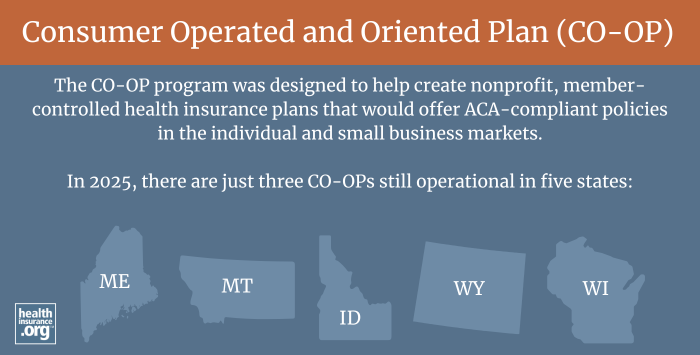
What is a Consumer Operated and Oriented Plan (CO-OP)?
Created by the Affordable Care Act, the CO-OP (Consumer Operated and Oriented Plan) program was designed to help create nonprofit, member-controlled health insurance plans that would offer ACA-compliant policies in the individual and small business markets.
How many states still have ACA CO-OPs?
Twenty-four states had CO-OP plans available in their exchanges starting in October 2013. But nearly all of them have since closed. As of 2025, there are just three CO-OPs still operational in five states:
- Community Health Options in Maine
- Mountain Health CO-OP (Montana Health CO-OP) in Montana, Idaho, and Wyoming
- Common Ground Healthcare Cooperative in Wisconsin
CO-OPs were initially supposed to get $10 billion in grant money, but that ended up being changed to $6 billion in loans, with fairly short repayment timelines. CO-OPs also fell victim to the risk corridors fiasco in far greater numbers than long-established health insurance companies. And the ACA's risk adjustment program was also challenging for CO-OPs.
When can I enroll in a CO-OP?
CO-OPs are just like any other ACA-compliant individual market health plan, which means you can enroll during the annual open enrollment period or during a special enrollment period. This is true regardless of whether you're enrolling through the Marketplace/exchange or directly through the CO-OP.
- Montana, Wyoming, and Wisconsin use HealthCare.gov as their Marketplace, with open enrollment that runs from Nov. 1 to Jan. 15.
- Maine and Idaho run their own health insurance Marketplaces (CoverME and Your Health Idaho). CoverME uses the same Nov. 1 - Jan. 15 open enrollment window as HealthCare.gov, while Your Health Idaho has a different schedule — Oct. 15 to Dec. 15.
(Note that for 2026 coverage, the federal government has proposed a nationwide open enrollment schedule of Nov. 1, 2025 through Dec. 15, 2025, applicable in all states.)
Special enrollment periods usually require a qualifying life event, but that's not always the case.
Note that if you work for a small business in a state where one of the remaining CO-OPs offers small-group health insurance, your employer might purchase group coverage from the CO-OP. They can do this at any time of the year, but your ability to enroll in the plan will be limited to your initial eligibility window, the annual open enrollment period designated by your employer, or a special enrollment period triggered by a qualifying life event.
Read more about CO-OP health insurance plans.


